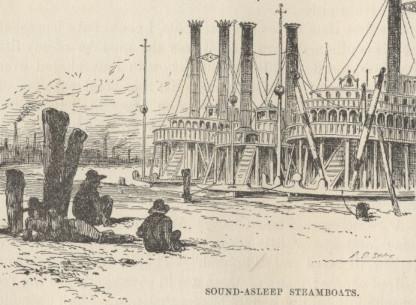July 10 Wednesday – The Polar Star Masonic Lodge Number Seventy-nine of St. Louis awarded Sam his third degree [Strong 88].
Good Bye Mississippi River: Day By Day
July 11 Thursday – Orion took an oath of office before a Supreme Court Justice in St. Louis. It was the one prestigious position of Orion’s life, owed to his persistent campaigning for Lincoln in 1860 and his connection with Edward Bates, who had been appointed Attorney General [Powers, MT A Life 102].
July 2 Tuesday – Orion Clemens received final instructions for his appointment as secretary of Nevada Territory [RI UC 1993 explanatory notes 574].
July 4 Thursday – Orion left his family in Keokuk and joined Sam, ready to travel to Nevada to take his new position as territorial secretary. He persuaded Sam to go with him, since Sam had the wherewithal to pay passage, and Orion did not. Sam did not request a “demit” (an official termination) from the Masons, which means he allowed himself to be suspended, and eventually not be a member [Jones 364].
July, early – Sam returned to St. Louis. Sometime in the first half of the year (Budd says “probably written in early 1861”) [“Collected” 1000] before leaving for the West, Sam wrote an untitled tale (“Ghost Life on the Mississippi”) not published until 1948, but which was “a milestone in Clemens’ early development as a writer. “Despite certain inconsistencies and weaknesses in the narrative handling, the tale revealed a growing literary maturity and a distinct ability to construct serious fiction of some length” [ET&S 1: 146].
June 12 Wednesday – Sam was probably no longer hiding out at his sister’s, for on this date he was raised to Master Mason (second degree) in the Polar Star Masonic Lodge Number Seventy-nine of St. Louis [Jones 364].
June 15 Saturday ca. – The Missouri state government had fled from Jefferson City by this date. Absalom Grimes wrote in his memoirs that he, Sam Bowen and Clemens were in Hannibal and were ordered to report to General Grey in St. Louis. (This may have been General Henry Gray, Jr. (1816-1892) spelled “Grey” by Grimes.) They made the trip on the Hannibal City and were instructed to be pilots carrying soldiers up the Missouri River, in pursuit of Governor Claiborne Fox Jackson (1806-1862). The three escaped and returned to Hannibal [Dempsey 266-7].
June 20 Thursday – Sam’s article, “Report on the Hannibal Home Guard” was printed in the Missouri State Journal [Camfield, bibliog.].
Last Boat Through the Union Blockade
Gary Scharnhorst in The Life of
May 14 Tuesday – Sam departed New Orleans as a passenger on the Nebraska. Commercial traffic was halted. This was the last boat allowed through the Union blockade at Memphis. Sam’s days as a river pilot were over, though he did not know it at the time. He would later wax nostalgic and eloquent about his idyllic career on the river. Just as his idyllic days of boyhood in Hannibal had abruptly ended, so too did his time on “the best job in the world.” Paine gives the name of the boat as the Uncle Sam: “I’ll think about it,” he said.
May 21 Tuesday – Sam arrived in St. Louis. Sam hid out in the Moffett residence, fearful of being arrested by Union agents and forced to pilot a gunboat. He stayed there for a few weeks [MTL 1: 121]. During his stay he was invited to visit his cousin James Lampton, also in St. Louis. James was Jane Lampton Clemens’ first cousin, and the model for Colonel Mulberry Sellers in The Gilded Age. Sam stayed at James’ house for a few days. It was during this stay when the famous “turnips and water” dinner was served.
May 22 Wednesday – The Polar Star Masonic Lodge Number Seventy-nine of St. Louis initiated Sam Clemens an Entered Apprentice, the next step up [Jones 364]. Note: Strong gives May 21 for the initiation [88].
June, mid – Back in Hannibal, Sam joined his merry band of play soldiers, the Marion Rangers, a ragtag bunch of friends who took up the Southern “cause.” In 1885 Sam wrote a humorous account of these two weeks in “The Private History of a Campaign that Failed,” where all names except Ed Stevens were fictitious [Rasmussen 370-1]. The group of old Hannibal schoolmates included William Ely, Asa Glasscock, Absalom Grimes, John D. Meredith, Sam Bowen, John L. RoBards, Perry Smith, and Ed Stevens [Budd, “Collected” 955-6; MTB 166]. The article below adds Tom Lyon and Charley Mills.
